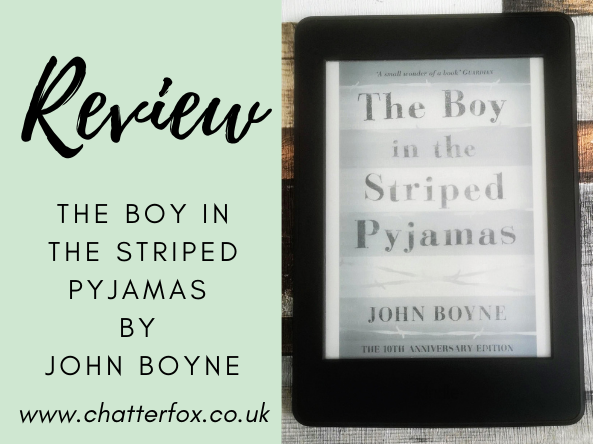The Boy In The Striped Pyjamas is a classic must read novel so it's hard to believe that this is the first time I've read it at the grand old age of 33! I think a lot of people read this book at school alongside other classics such as Of Mice and Men, The Diary of Anne Frank and To Kill A Mockingbird- can you believe I've never read any of those? I'm starting to understand why the secondary school I attended was closed down after my year group left and ultimately demolished. The reading list seems to be severely lacking but secondary school gripes aside- is this book as powerful as I've been led to believe?
In short, yes. This book is an immensely powerful look into life either side of the fence. It focuses on Bruno and Shmuel. Bruno's father works for the Fuhrer and as such lives in relative safety, a stark contrast to the life of Jewish boy, Shmuel who survives each day as it comes. The two boys from differing backgrounds embark on a forbidden friendship that is tender and honest and reminds us how innocently children see the world.
I think using children for the main characters is ingenious. Though the reader understands how Nazi Germany divided the world and segregated people the use of the children in this novel really helps you to forget that and appreciate how simply children see the world. It makes it even harder for the adult reader to comprehend the history that inspired such a sad tale. Surely each child, race and person is equal- if only the adults with power could be reminded of that. Children really don't see these things- they love people and form bonds regardless of symbol and status.
There are moments in the book that are truly shocking but those events are played through the eyes of a child and you see how something we understand as dangerous and gut wrenchingly inhumane can be viewed by a child as wonderous and exciting. It makes me sick to think that so many children went through what these characters did.
Obviously the readers allegiance is with the occupants of the concentration camps but this novel also shows us how difficult life was for those dragged along by their family ties. Bruno is witness to things no child should be. It shows us how being safe from the Nazi regime doesn't necessarily equate to a happy and safe life.
There is a bit of debate about the ages of the children, in particular Bruno who is 9 being so oblivious to the horror that's occurring on his doorstep but in John Boyne's defence this is a book written specifically for a a younger audience and I think psychology would come into play- how many children do we know that revert to a younger childlike state when afraid? Shmuel is as much Bruno's light in the darkness as Bruno is to Shmuel, both these boys are escaping something and as we know denial is a powerful tool when we feel scared and alone. Things are easy to ignore when they need to be.
The book is renowned for it's truly tragic ending which I won't share as I don't want to ruin it for those that have not yet read it but I will say it was heartbreaking and brought me to tears. It showed the fierceness and innocence of a child's friendship and how devastating that can be. I daren't watch the film adaptation due a genuine fear of how emotional I may get.
I see why this book is recommended on school syllabuses. It has a lot to teach us not necessarily in an historically accurate way in reference to the holocaust but it certainly demonstrates friendship, fear and endurance.
Thanks For Reading








No comments:
Post a Comment
Thank you for supporting me on my journey to raise awareness about mothers on the autistic spectrum. We do exist, we just need people to know we do!